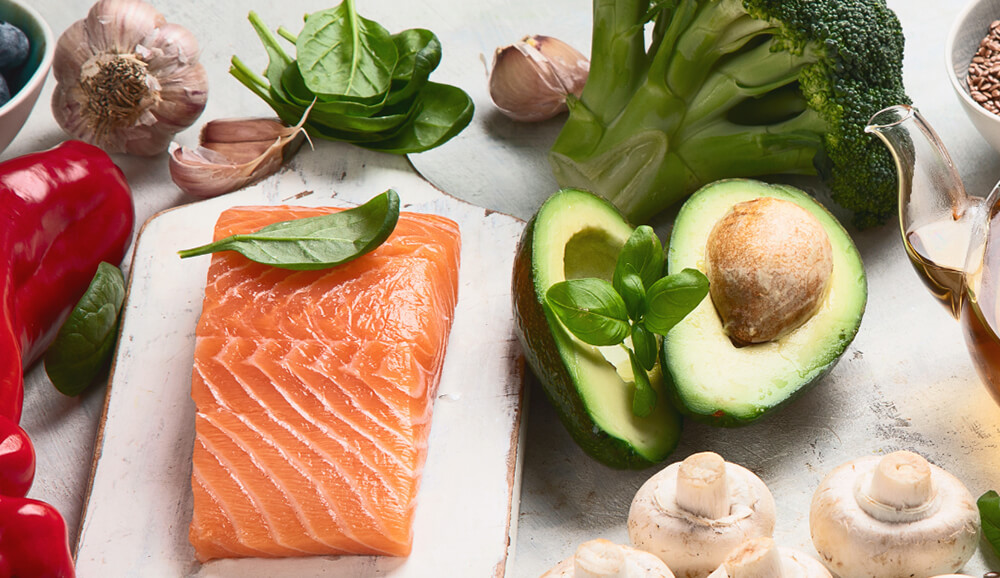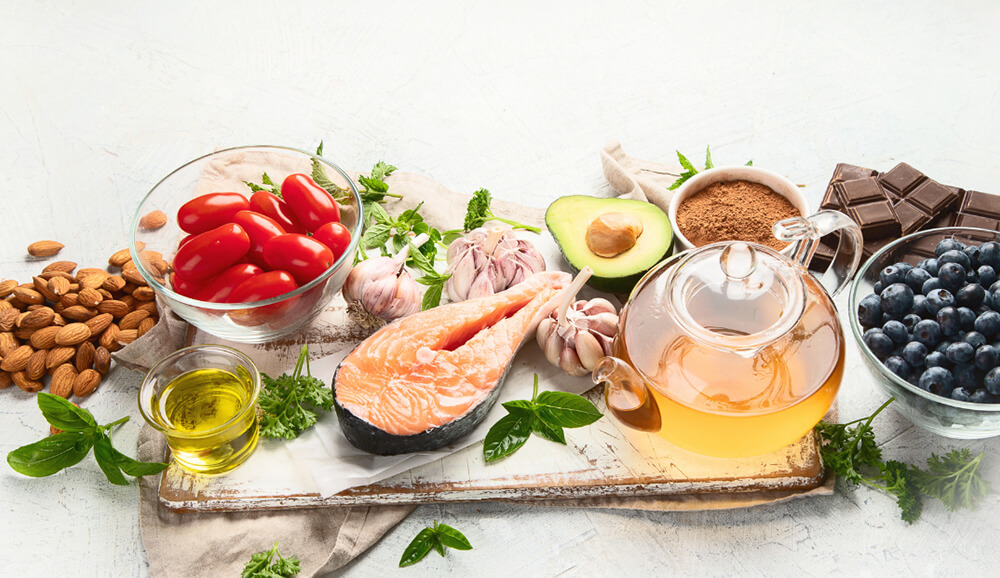Anti-Inflammatory Diet: What To Eat & To Avoid
Inflammation is a double-edged sword. It’s the body’s natural defense system, springing into action to heal injuries and fight infections. But when it goes into overdrive and becomes chronic, it paves the way for serious health issues like cardiovascular disease, diabetes, and rheumatoid arthritis.
The good news? What you eat can help keep inflammation in check. Discover the basics of an anti-inflammatory diet, including which foods you’ll want to choose and avoid to improve your wellbeing.
How Chronic Inflammation Affects Your Health
Inflammation is a natural part of the body’s defense mechanism, helping to fight infections and repair injuries. But when inflammation becomes chronic, it can wreak havoc on your health.
Acute inflammation is when your body reacts to a specific problem with pain, redness, swelling, and loss of function. It’s a temporary response.
Chronic inflammation is ongoing and can be caused by many things, making it hard to figure out what started it. This long-term inflammation can lead to serious health issues.

The Link Between Inflammation and Chronic Diseases
Chronic inflammation plays a significant role in the onset and progression of many chronic diseases, including:
- Heart Disease: Atherosclerosis is a chronic inflammatory disease closely tied to the buildup of plaque in the arteries. It can lead to serious problems like heart attacks and strokes. Research has shown that individuals with elevated inflammatory markers, like C-reactive protein (CRP) or low omega3-index levels, have a higher risk of cardiovascular events.
- Type 2 Diabetes: Chronic inflammation can make cells resistant to insulin, the hormone that regulates blood sugar. Over time, this insulin resistance can lead to the development of type 2 diabetes and its associated complications.
- Autoimmune diseases, like rheumatoid arthritis.
- Gastrointestinal disorders like inflammatory bowel syndrome, Crohn’s disease and ulcerative colitis.
- Lung diseases, such as chronic obstructive pulmonary disease (COPD) and asthma.
- Neurodegenerative diseases, such as Parkinson’s disease.
- Some types of cancer: Long-term inflammation can contribute to DNA damage, potentially leading to the formation of cancer cells. While inflammation itself does not cause cancer, it can create an environment where cancerous cells thrive and grow.
Impact on Mental Health
Chronic inflammation doesn’t just affect your physical health — it can also take a toll on your mental well-being.
Studies have shown that elevated levels of inflammation are linked to depression, anxiety, and other mood disorders. Elevated levels of IL-6 can increase activity in the anterior cingulate cortex, leading to changes in mood and cognition. Over time, this can result in feelings of fatigue, brain fog, and emotional distress.
Weight Gain and Metabolic Health
Chronic inflammation is also linked to weight gain and metabolic disturbances. For example, fat tissue can produce inflammatory molecules like cytokines, contributing to a cycle of weight gain and inflammation. This can lead to metabolic syndrome, a cluster of conditions that increase the risk of heart disease, stroke, and type 2 diabetes.
By managing inflammation through diet and lifestyle changes, it’s possible to break this cycle and support healthier metabolic function.
Why Addressing Chronic Inflammation Matters
Left unchecked, chronic inflammation can silently damage tissues and organs over time, often without obvious symptoms until significant health issues arise.
This is why it’s so important to adopt strategies —like following an anti-inflammatory diet— that can help reduce inflammation and protect against long-term consequences.
What is an Anti-Inflammatory Diet?
Anti-inflammatory eating is about choosing whole, nutritious foods that help lower inflammation in the body while cutting down on foods that promote it. This diet usually includes lots of fruits and vegetables, especially leafy greens and berries. It also includes fatty fish like salmon, whole grains, and healthy fats found in olive oil and nuts.
It also avoids processed foods, refined carbohydrates, and sugary beverages, which have been linked to increased inflammatory markers and a higher risk for chronic disease. By prioritizing anti-inflammatory foods, this diet helps combat inflammation, supports overall health and reduces the risk of conditions like heart disease, diabetes, and arthritis.
The Role of Diet in Reducing Inflammation
Certain anti-inflammatory foods can help control and reduce chronic inflammation. A diet rich in these foods offers the body powerful nutrients and anti-inflammatory compounds that can decrease inflammatory markers and support long-term health.
Foods That Reduce Inflammation

Fruits and Vegetables
Leafy greens like spinach and kale, along with cruciferous vegetables such as broccoli and cauliflower, are packed with antioxidants that neutralize harmful free radicals in the body.
Berries — particularly blueberries, strawberries, and blackberries — are also rich in antioxidants and fiber, making them some of the best foods that reduce inflammation.
Healthy Fats
Omega-3 fatty acids are crucial in reducing inflammation, particularly from sources like fatty fish (salmon, sardines, and mackerel). Studies have shown that omega-3s can lower levels of certain inflammatory markers and help combat conditions like arthritis. With that said, it is critical to get high enough levels of these essential fatty acids to make a difference.
Unlike trans fats found in processed foods, healthy fats from sources like extra virgin olive oil, salmon and avocados can help the body manage inflammation better.
Whole Grains and Fiber
Whole grains such as oats, brown rice, and quinoa provide essential fiber that can lower C-reactive protein (CRP), an inflammatory marker linked to chronic conditions.
Fiber supports a healthy gut microbiome, which is key to regulating the immune system’s inflammatory response. These grains, often part of the Mediterranean diet, are not only delicious but also beneficial in fighting inflammation and supporting long-term heart health.
Foods That Trigger Inflammation

Processed Foods
Processed meats, like breakfast cereals, chips and frozen meals, often contain partially hydrogenated oils, which is another name for trans fats. Trans fats are now banned in the US, but are allowed in small amounts per serving. The amount of partially hydrogenated oils can quickly add up depending on what you eat and the serving size.
Partially hydrogenated oils promote inflammation in the body and are linked to a higher risk of heart disease, stroke, type 2 diabetes, and weight gain.
Processed foods are also often loaded with preservatives and food additives that can mess with the gut microbiome and trigger inflammation. These include:
- Monosodium glutamate (MSG): A chemical food additive that can trigger chronic inflammation, among other health concerns. MSG is commonly found in soy sauce, fast food, soups, salad dressings, and deli meats.
- Artificial sweeteners, like aspartame, commonly often found in diet sodas, flavored sparkling water, flavored yogurts, and breakfast cereals.
- Artificial food colors.
- Maltodextrin (MDX) and carboxymethyl cellulose (CMC): These food additives impair the intestinal mucus barrier and increase the risk of inflammatory bowel disease.You’ll often find these additives in baked goods, frozen meals, dairy products and more.
Ideally, it’s best to choose fresh foods that are made from scratch. It’s also wise to avoid products made with artificial colors.
Sugary Beverages and Sweets
Sugary drinks and sweets, while tempting, significantly contribute to inflammation. High levels of sugar cause spikes in insulin, which in turn promotes inflammation throughout the body. Chronic consumption of sugary beverages has been linked to obesity, diabetes, and chronic inflammation, which increases the risk of several chronic diseases.
Refined Carbohydrates
Refined grains like white bread and pasta are stripped of their fiber, causing them to be quickly digested and absorbed, resulting in rapid increases in blood sugar. This spike can lead to higher levels of inflammatory markers. Replacing these foods with whole grains can help reduce inflammation and support overall metabolic health.
Anti-Inflammatory Spices and Herbs

Turmeric and Ginger
Turmeric contains curcumin, a compound with powerful anti-inflammatory effects. Numerous studies have shown curcumin’s ability to reduce chronic inflammation, particularly in conditions like arthritis and cardiovascular disease.
Ginger is another potent anti-inflammatory. It contains gingerol, which has been shown to lower markers of inflammation in several clinical trials.
Garlic and Cinnamon
Garlic is rich in sulfur compounds that can help lower inflammation. Cinnamon is packed with antioxidants that have anti-inflammatory properties. Both spices have been studied for their ability to support immune health and fight chronic conditions.
How Omega 3s Help Fight Inflammation
Omega-3 fatty acids are among the most powerful nutrients for reducing inflammation in the body. Found in foods like fatty fish— as well as high-quality liquid fish oil supplements — omega-3s have been extensively researched for their anti-inflammatory effects.
Reducing Inflammatory Markers
Omega-3 fatty acids – particularly EPA (eicosapentaenoic acid) and DHA (docosahexaenoic acid) that you get in fatty fish – have been shown to decrease the production of pro-inflammatory molecules such as cytokines and eicosanoids.
Individuals who regularly consume omega-3s have lower levels of inflammatory markers, like C-reactive protein (CRP) and interleukin-6 (IL-6). These reductions are particularly important for managing conditions like rheumatoid arthritis, heart disease, and inflammatory bowel disease, all of which are linked to chronic inflammation.
You can get some omega-3s from flaxseed and walnuts, but beware. Plant-based omega-3 foods contain a different type of omega-3 called ALA. ALA doesn’t have the same anti-inflammatory muscle as the EPA and DHA you get in fatty fish.
Omega-3s vs. Omega-6s
An imbalance between omega-6s and omega-3s can tip the scales toward chronic inflammation. The typical Western diet tends to be high in omega-6s and low in omega-3s, which promotes the production of inflammatory compounds.
By increasing your intake of omega-3-rich foods or fish oil supplements, you can restore balance and help the body shift toward a more anti-inflammatory state.
Joint Health and Mobility
For those dealing with joint pain or stiffness due to arthritis or injury, omega-3s can provide significant relief. Research has found that omega-3s can reduce symptoms of rheumatoid arthritis by decreasing inflammation in the joints, leading to improved flexibility and reduced pain. As part of an anti-inflammatory diet, omega-3s offer a natural way to enhance joint health and overall mobility.
Benefits of Following an Anti-Inflammatory Diet
Reduced Risk of Chronic Diseases
Adopting an anti-inflammatory diet is not just about reducing discomfort or improving short-term health. It’s a powerful tool in the fight against chronic diseases like heart disease, type 2 diabetes, and even certain cancers.
Improved Energy Levels and Mood
Because chronic inflammation often leaves people feeling fatigued and sluggish, reducing inflammation can result in a noticeable boost in energy and overall well-being. A healthy diet rich in anti-inflammatory foods can also lead to improvements in mental health, particularly in reducing symptoms of anxiety and depression.
Common Myths About the Anti-Inflammatory Diet
Myth: All Fats Are Bad
Trans fats and partially hydrogenated oils can cause inflammation. But healthy fats, like those in extra virgin olive oil and fatty fish, help manage inflammation and support heart health. Eating the right fats is important to keep inflammation under control.
Myth: You Should Cut Out Carbs Completely
Carbohydrates are often misunderstood. While refined carbohydrates can promote inflammation, whole grains are rich in fiber and other nutrients that support overall health. It’s about choosing the right kinds of carbs, not cutting them out entirely.
Myth: You Have to Follow a Strict or Complicated Regimen
An anti-inflammatory diet can be flexible and adapted to fit your lifestyle. The focus is on making gradual changes, like increasing your intake of fruits, vegetables, and omega-3s, while reducing processed and sugary foods. There’s no need to eliminate all carbs or fats — it’s about choosing whole grains and healthy fats that help your body fight chronic inflammation.
Reduce Chronic Inflammation With a Healthy Diet Supplemented by Omega 3s
Eating an anti-inflammatory diet is one of the best ways to improve your wellbeing. By prioritizing nutrient-rich foods like fruits, vegetables, fish, and whole grains, you can support your body’s natural defenses and reduce the risk of chronic diseases.
One easy way to ensure you are adequately covered in the omega-3 department is with Omega Cure® Extra Strength. It provides the omega-3s you need to fight inflammation in one daily dose.
Discover Omega Cure Extra Strength and how it can support your wellness goals. It’s a small change that can make a world of difference.
Popular posts



Related posts









